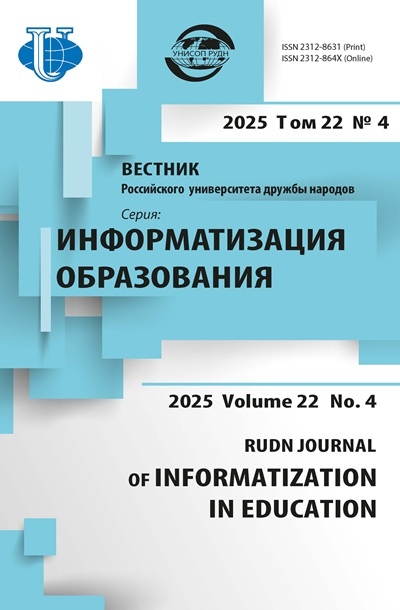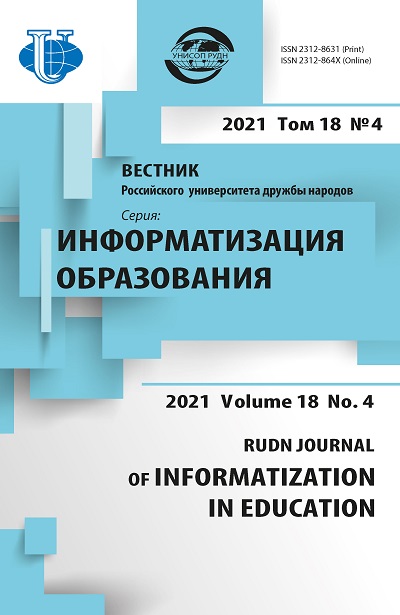Том 18, № 4 (2021)
- Год: 2021
- Статей: 7
- URL: https://journals.rudn.ru/informatization-education/issue/view/1514
- DOI: https://doi.org/10.22363/2312-8631-2021-18-4
Весь выпуск
ГЛОБАЛЬНЫЕ АСПЕКТЫ ИНФОРМАТИЗАЦИИ ОБРАЗОВАНИЯ
Tренды образовательных технологий в России и мире в 2020 г.: анализ поисковых запросов в Google Trends
Аннотация
Проблема и цель. Рассматриваются ключевые тенденции, которые стали доминировать в 2020 г. в период пандемии в сфере образования. Изучались результаты исследований Gartner - консалтинговой компании, специализирующейся на рынках информационных технологий, Организации экономического сотрудничества и развития, научно-исследовательского университета Великобритании The Open University, глобального обзора настроений в сфере обучения и развития L&D Global Sentiment Survey и HolonIQ - компании, специализирующейся на аналитике образовательного рынка. Методология. Данные указанных отчетов были объединены и сгруппированы, а затем проанализированы в Google Trends на предмет популярных поисковых запросов в России и мире. Выборка данных производилась за 2020 г. в Google Trends в разделе «Работа и образование». Результаты. Выделены четыре доминантных направления: 1) отрасли; 2) форматы; 3) инструменты; 4) аналитика. Анализировались первые две категории. В рамках форматов на примерах рассмотрены технологии, применяемые в массовых открытых онлайн-курсах, гибридном, смешанном обучении, персонализации, перевернутом классе, инклюзии и при использовании симуляторов. В рамках «инструментов» - мобильные технологии, социальные сети, смешанная и дополненная реальность (AR/VR), виртуальные классы, искусственный интеллект (AI), система управления обучением (LMS). Заключение. Самым популярным поисковым запросом среди российских пользователей и мировой аудитории в целом в группе «форматы» стали вопросы реализации инклюзивной практики в условиях пандемии COVID-19. В категории «инструменты» у пользователей также сложился консенсус: больше всего их в 2020 г. интересовали характеристики и виды LMS-платформ для более эффективного осуществления онлайн-обучения.
 291-304
291-304


ПЕДАГОГИКА И ДИДАКТИКА ИНФОРМАТИЗАЦИИ
Методологические подходы к формированию цифровой компетентности учителя
Аннотация
Проблема и цель. Цифровая трансформация в образовании требует нового подхода к традиционным методикам обучения и приводит к ускоренному изменению методов и форм обучения. Изучение и выбор возможностей эффективных сетевых сред при создании цифрового образовательного контента сегодня становятся одной из главных задач для работников сферы образования. Для этого необходимы высококвалифицированные педагоги, у которых сформированы цифровые компетенции и навыки обучения в течение всей жизни, творчески подходящие к постоянному профессиональному росту. В этой связи важным является определение методологических основ формирования цифровой компетентности учителей. Целью исследования стала конкретизация особенностей методологических подходов к формированию цифровой компетентности учителей. Методология. Использованы общетеоретические методы исследований: изучение и анализ литературных данных теоретической направленности; системно-структурный анализ; конкретизация роли подходов к формированию цифровой компетентности учителей. Проведен анализ особенностей методологических подходов к формированию цифровой компетентности учителей. Результаты. Рассмотрена проблема формирования цифровой компетентности учителей. Показано, что необходимость развития цифровой компетентности затрагивается во многих научных работах, однако недостаточно раскрыта в отечественных научно-практических исследованиях. Представлены системный, деятельностный, аксиологический, личностно-ориентированный подходы к формированию цифровой компетенции. На основе анализа соответствующей литературы определены преимущества выбранных подходов в формировании цифровых компетенций учителей, их основные характеристики. Заключение. Подходы, используемые в качестве методологической основы исследования, не только не противоречат, но и дополняют друг друга, выступают в качестве основы для построения концепции и структурно-содержательной модели формирования цифровой компетентности учителя.
 305-313
305-313


Модель цифровых компетенций педагогов: терминологический и содержательный аспекты
Аннотация
Проблема и цель. Обосновывается структура модели цифровых компетенций педагогов, рассматриваются принципы организации персонализированной методической поддержки для обеспечения процессов цифровой трансформации школы. Методология. Построение понятийно-терминологического аппарата исследования выполнено на основе теоретического анализа и синтеза научных положений источников, многообразия дефиниций понятий и терминов. Сравнительный анализ российских и зарубежных моделей цифровых компетенций позволил сформировать конструкт модели цифровых компетенций педагога. Произведено моделирование управленческой деятельности по развитию цифровых компетенций педагогов. Результаты. Предложена структура модели цифровых компетенций педагогов, уровневых профилей и дескрипторов их цифровых компетенций. Показан алгоритм персонализации образовательной траектории и модель управления развитием цифровых компетенций педагогов, отвечающая требованиям непрерывности, индивидуализации, системности. Заключение. Результаты исследования могут быть применены командами проектов цифровой трансформации, руководителями образовательных организаций для совершенствования управления процессами цифровой трансформации.
 314-325
314-325


ОБУЧЕНИЕ ИНФОРМАТИКЕ
Использование специализированных электронных образовательных ресурсов для подготовки школьников к олимпиадам по информатике
Аннотация
Проблема и цель. Рассматривается проблема совершенствования подготовки школьников к олимпиадам по информатике с помощью специализированного электронного образовательного ресурса (ЭОР). Методология. В исследовании использован анализ существующих ЭОР для подготовки к олимпиадам по информатике. Результаты. Выдвинуто предположение о необходимости создания специализированного ЭОР для подготовки школьников к олимпиадам по информатике, сформулированы требования к нему, описан интерфейс и методика эксплуатации ЭОР. Заключение. Использование рассмотренного в статье ЭОР позволяет повысить эффективность подготовки школьников к участию в олимпиадах по информатике.
 326-336
326-336


Особенности подготовки по программированию будущих учителей информатики
Аннотация
Проблема и цель. Выявляются подходы к подготовке по программированию будущих учителей информатики в условиях технологизации современного общества. Цели: 1) определить особенности обучения программированию студентов-информатиков педагогических вузов; 2) сформировать систему языков программирования для обучения будущих учителей информатики. Методология. Для решения обозначенной проблемы использован комплекс методов исследования: анализ нормативных документов, определяющих приоритетные задачи образования, и исследований и научно-методических публикаций зарубежных и отечественных ученых, а также опыт подготовки по программированию студентов-информатиков педагогических вузов; рефлексия содержания полученного знания; выявление подходов к подготовке по программированию будущих учителей информатики. Результаты. Проанализирован опыт подготовки по программированию студентов педагогических университетов, в том числе опыт преподавателей, что позволило выявить такие актуальные в современных условиях подходы к обучению будущих учителей информатики программированию, как фундаментальный и разноуровневый; определены особенности обучения программированию с учетом профессионально-педагогической направленности подготовки будущих учителей информатики; предложена многоуровневая система языков программирования для обучения будущих учителей информатики. Заключение. В условиях динамично развивающейся области информационных технологий и все возрастающего интереса к программированию важно обеспечить школьное образование учителями информатики, владеющими компетенциями в области программирования, готовыми к обучению школьников современным языкам программирования.
 337-346
337-346


ЦИФРОВАЯ ОБРАЗОВАТЕЛЬНАЯ СРЕДА
Выращивание данных для школьных виртуальных лабораторий
Аннотация
Проблема и цель. Рассматривается преподавание школьных дисциплин, связанных с формированием статистической, математической, вычислительной и исследовательской грамотности. Цель состоит в порождении данных в ходе экспериментов, условия которых диктуются учениками. Методология. В исследовании использованы генерация данных в агентных моделях NetLogo и последующая статистическая обработка в средах CODAP и R. Результаты. Показано, что генеративный подход позволяет ученикам работать с данными, которые порождаются агентами-исполнителями, выполняющими указания учащегося. При этом ученик находится в позиции ученого, который планирует собственные эксперименты и анализирует полученные в их процессе данные. Заключение. Предложенный подход генерации данных для их последующего анализа приобщает школьников к современной культуре выращивания и обмена данными и генерирующими их моделями.
 347-359
347-359


РАЗРАБОТКА УЧЕБНЫХ ПРОГРАММ И ЭЛЕКТРОННЫХ РЕСУРСОВ
Роль онлайн-курсов в формировании практико-ориентированной составляющей образовательных программ подготовки IT-специалистов
Аннотация
Проблема и цель. Рассматривается проблема обеспечения цифровой трансформации российской экономики через увеличение количества выпускников IT-направлений, подготовленных в соответствии с требованиями работодателей. Целью исследования стала разработка методики обучения бакалавров дисциплине «Web-проектирование», направленной на усиление практико-ориентированной составляющей образовательных программ подготовки IT-специалистов в вузе в рамках реализации смешанного обучения с использованием онлайн-курсов. Методология. На основе анализа результатов исследований по различным аспектам применения онлайн-курсов и сравнения различных моделей включения онлайн-курсов в процесс обучения в вузе выявлена оптимальная модель смешанного обучения в региональном вузе. По итогам сравнения различных платформ обучения студентов web-разработке выбраны интерактивные курсы HTML Academy как наиболее отвечающие запросам профессионального сообщества к формируемым компетенциям выпускников. Предложена методика обучения web-проектированию бакалавров IT-направлений подготовки, основанная на модели смешанного обучения. Представлен опыт Нижневартовского государственного университета (факультет информационных технологий и математики) по внедрению разработанной методики с использованием онлайн-курсов HTML Academy. Осуществлено экспериментальное обучение студентов с применением разработанной методики, проведена оценка его эффективности для повышения качества формируемых универсальных и профессиональных компетенций бакалавров IT-направлений подготовки. Результаты. Разработана и внедрена методика обучения студентов IT-направлений подготовки отдельным разделам дисциплины «Web-проектирование», ориентированная на требования работодателей. На основе экспертных мнений независимых представителей профессионального сообщества получена положительная оценка разработанной методики обучения web-проектированию студентов направлений подготовки «Информатика и вычислительная техника», «Информационные системы и технологии». Заключение. Реализация модели смешанного обучения с использованием онлайн-курсов, разработанных ведущими экспертами со стороны профессионального сообщества, способствует усилению практико-ориентированной составляющей подготовки IT-специалистов в вузе и позволяет существенно повысить качество профессиональной подготовки выпускника, отвечающей требованиям профессиональных стандартов и работодателей.
 360-369
360-369
















